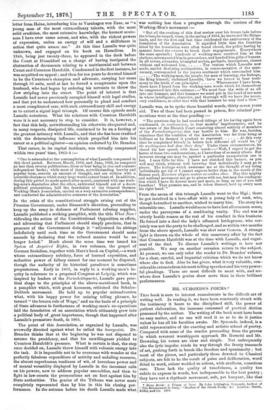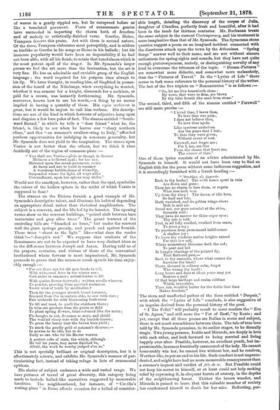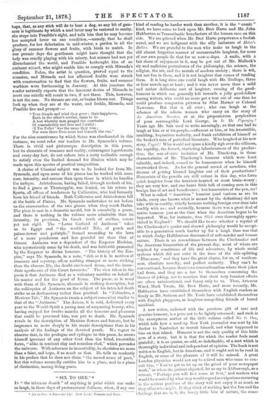MR. SYMONDS'S POEMS.*
Tins book is sure to interest connoisseurs in the difficult art of writing well. In reading it, we have been constantly struck with the testimony it bears to the disciplined skill, the power of patient elaboration, the immense command of poetical diction possessed by the author. The writing of the book must have been no easy matter, and no one will read it so as to do it justice unless he has all his faculties awake. Mr. Symonds, indeed, is a mild representative of the exacting and artistic school of poetry. Compared with some of the oracles proceeding from the groves in which reverent worshippers approach Mr. Rossetti and Mr. Browning, his verses are clear and simple. Not unfrequently also the lyric impulse rends its way through the frosty trammels of art, gushing forth in brook-like freedom and spontaneity ; but most of the pieces, and particularly those devoted to Classical subjects, are felt to be the result of pains and deliberation, word fitted to word, colour wedded to colour, with studious, conscious care. These lack the quality of tunefulness, a quality too subtle to express in words, but indispensable to the best poetry ; they have not a rhythmic movement, soft, yet buoyant, like that • Many Moods: a Volume of Verse. By John Addington Symonds, Author or "The Renaissance in italy,". Studies of the Greek Poeta," Jo. London: Smith, Elder, and Co. 1878.
of waves in a gently rippled sea, but lie outspread before us like a tesselated pavement. Poets of consummate genius have succeeded in imparting the charm both of freedom and of melody to artistically-finished verse. Goethe, Heine,
Tennyson deserve this praise. Art with them is second nature. Of the three, Tennyson elaborates most perceptibly, and is seldom so birdlike as Goethe in his songs or Heine in his ballads ; but his immense popularity would have been an impossibility if he had not been able, with all his finish, to retain that tunefulness which is the most potent spell of the singer. In Mr. Symonds's larger poems we feel the art more than the fascination, but the art is very fine. He has an admirable and enviable grasp of the English language ; the word required for his purpose rises always to his lip. We have thought, in reading him, of Siegfried in posses- sion of the hoard of the Nibelungs, when everything he wanted, whether it was armour for a knight, diamonds for a necklace, or gold for a crows, was instantly forthcoming. Mr. Symonds, moreover, knows how to use his words,—a thing by no means implied in having a quantity of them. His copia verbortim is great, but it would be unjust to call him verbose. His descrip- tions are not of the kind in which festoons of adjective hang upon and disguise a few bare poles of fact. The stanzas entitled "South- ward Bound," in which he tells a " dear friend " what he, the
friend, is likely to see when he leaves our " chary northern clime," and flies " on summer's swallow-wing to Italy," afforded perilous opportunities for indulging in sonorous generality, but Mr. Symonds does not yield to the temptation. The stanza upon Venice is not better than the others, but we think it rises decidedly out of the region of common-place :-
" You shall see Venice—glide as though in dreams
Midmost a hollowed opal ; for her sky, Mirrored upon the ocean-pavement, seems At dawn and eve to build in vacancy A wondrous bubble-dome of wizardry, Suspended where the light, all ways alike Circumfluent, upon her sphere may strike."
"Would not the amethyst, however, rather than the opal, symbolise the colour of the hollow sphere in the midst of which Venice is supposed to float?
The stanzas on the Riviera furnish a good example of Mr. Symonds's descriptive talent, and illustrate his habit of depending on appropriate detail rather than rhetorical amplification. The subject is a convent, and the life led by its inmates. The opening verses show us the convent buildings, "poised aloft between bare mountains and grey olive trees." The gaunt terraces of the encircling hills are "bleached as bone," but under the convent wall the grass springs greenly, and peach and apricot flourish. These trees " shoot to the light " like—what does the reader think ?—" Joseph's rod." We suppose that students of the Renaissance are not to be expected to have very distinct ideas as to the difference between Joseph and Aaron. Having told us of the prayers, ecstacies, and visions of those of the conventual brotherhood whose fervour is most impassioned, Mr. Symonds proceeds to prove that the common monk spends his time enjoy- ably enough :—
" For are there not for old men beads to tell,
With whispered Ayes in the winter sun ; Cool aisles in summer ; missal-leaves to fill With quaint flower-fretwork ; written scrolls whereon To ponder, pressing from parched sentences Sweet wine of truth by meditation ?
Then for the younger stretch broad terraces, Scooped from the mountain side, to sow with corn ; Fair orchards fat with blossoming fruit-trees To till and tend, to quell the stubborn thorn ; In trim-set gardens from the grove or field To plant spring flowers, faint-coloured like the morn; Fir-boughs to cut, fir-cones to store, and shield The wattled sheep-cote with dry lentisk-leaves ; To press the honey that the brown bees yield ; To stack the goodly gold of autumn's sheaves ;— In nowise to be idle, but to do Daily as one who for his Master weaves A perfect robe of state, the which, although He toil for years, may never finished be, Albeit, the work be worthy judged e'en so."
'This is not specially brilliant or original description, but it is affectionately minute, and exhibits Mr. Symonds's manner of par- ticularising fact, instead of taking refuge in lists of ornamental epithets.
His choice of subject embraces a wide and varied range. We have pictures of travel of great diversity, this category being made to include ballad-like narratives suggested by memorable localities. The neighbourhood, for instance, of " Czecilia's resting-place " in Rome affords occasion for a ballad of consider-
able length, detailing the discovery of the corpse of Julia, daughter of Claudius, perfectly fresh and beautiful, after it had been in the tomb for thirteen centuries. Mr. Buchanan treats the same subject in the current Contemporary, and his treatment is more imaginative than that of Mr. Symonds. The Syracusan stone quarries suggest a poem on an imagined incident connected with the disastrous attack upon the town by the Athenians. "Spring Songs " answer well to their name, and are not without sincere enthusiasm for spring sights and sounds, but they have not quite enough picturesqueness, melody, or distinguishing novelty of any kind to overcome the triteness of the topic. " Dream-Pictures " are somewhat more didactic, and somewhat more melancholy, than the " Pictures of Travel." In the " Lyrics of Life " there seems to lurk some reference to the personal history of the writer. The last of the five triplets on " Renunciation " is as follows :-
"Go, let me live henceforth alone : My vows, that were so firm, are blown By thy false breath like sand from stone."
The second, third, and fifth of the stanzas entitled " Farewell" are still more precise :-
" I loved thee, I leave thee,
To love thee was pain ; I dare not believe thee, To love thee again.
Like spectres unshriven Are the years that I lost ; To thee they were given, Without count of coat.
Farewell, and forget me ; For I, too, am free From the shame that beset me, The sorrow of thee."
One of these lyrics consists of an advice administered by Mr. Symonds to himself. It would not have been easy to find an English title for the poem without some ludicrous suggestion, and
it is accordingly furnished with a Greek heading :—
" `TwoOircri els ikacurr4v.
Back to thy books ! The swift hours spent in vain Are flown and gone : Thou has no charm to lure them, or regain What loss bath won.
Up from thy sleep ! The dream of idle love, So frail and fair, Hath vanished, and its golden wings above Melt in mid air.
Stand not, nor gaze astonied at the skies, Serenely cold : They have no answer for thine eager eyes; Thy tale is told. Fool, in all folly cradled, swathed from sense, To trust a toy ; To purchase from pronounced indifference A shallow joy ; To leave thy studious native heights untrod For that low soil, Where momentary blossoms deck the sod ; To pant and toil In hungry chasings of the painted fly,
That fluttered past,—
Back to thy summits, where what cannot die Survives the blast!
There, throned in solitary calm, forget Who wrung thy heart : Long hours and days of silent years may yet Restore a part Of that large heritage and realm sublime Which, love-elate, Thou fain would'st barter for the fields that time Makes desolate."
The stern and unaffected pathos of the lines entitled "Despair," with which the " Lyrics of Life" conclude, is also suggestive of an impulse derived from the personal history of the poet.
" I Tre Felici " will probably recall to most readers the " Eve of St. Agnes," and still more the " Pot of Basil," by Beats ; and yet, except that all three poems are Italian in scene and subject, there is not much resemblance between them. The tale of true love told by Mr. Symonds promises, in its earlier stages, to be dismally tragic. Two young persons, Iroldo and Miranda, are deeply in love with each other, and look forward to being married and living happily ever after. Prasildo, however, an excellent youth, but im- pressionable, becomes frantically enamoured of the lady. He cannot honourably win her, he cannot live without her, and he resolves, Werther-like, to put an end to his life. Such conduct is not unprece- dented, and might have had no more memorable consequences than a coroner's inquest and verdict of felo de se. But Prasildo could not keep his secret to himself, or at least could not help seeking relief by expressing it, in eloquent bursts of oratory, in the depths of the neighbouring forest. Thither the lovers wander, and Miranda is pained to learn that this valuable member of society has condemned himself to death for her sake. Reflecting, per- haps, that, as any stick will do to beat a dog, so any bit of gam- mon is legitimate by which a mad lover may be restored to sanity,
she steps into Prasildo's sight, and tells him that he may become her accepted lover on one condition,—namely, that he shall produce, for her delectation in mid-winter, a garden in all the glory of summer flowers and fruits, with birds to match. In oar prosaic days the gentleman might have thought that the lady was cruelly playing with his misery, but science had not yet disenchanted the world, and Prasildo bethought him of an eminent wizard, who might enable him to comply with Miranda's condition. Folco, the artist in question, proved equal to the occasion, and Miranda and her affianced Iroldo were struck with consternation to find that the flowers, fruits, and summer warblers were forthcoming in January. At this juncture the reader naturally expects that the innocent device of Miranda to avert one suicide will result in two, if not three. This, however, is not the case. No throats are cut, or brains blown out. Things look up when they are at the worst, and Iroldo, Miranda, and Prasildo live and prosper:—
6, True friends and tried they grew ; their happiness,
Each in the other's service, came to be A test whereby men ganged the courtesies Of comradeship and love and loyalty: Tre Fella ' was the name they won ; Nor were there lives more leal beneath the sun."
For the nice contrivance by which Satan was checkmated in this instance, we must refer our readers to Mr. Symonds's volume.
There is vivid and picturesque description in this poem, but its elements of romance and reality, extravagant legerdemain and every-day fact, do not cohere into a unity realisable enough to satisfy even the limited demand for illusion which may be made upon this species of poetical composition.
A choice of Classical subject was to be looked for from Mr. Symonds, and upon none of his pieces has he worked with more care, intensity, and success than upon those in which he handles the antique. Aristodemus, having failed, through no fault of his, to find a grave at Thermopylae, was denied, on his return to Sparta, all offices of tenderness by Calibrates, who had formerly been his friend of friends. Both Callicrates and Aristodemus fall at the battle of Platma. Mr. Symonds undertakes to set before us the conversation of the two ghosts when they reach Hades. The piece is cast in a dramatic mould, but is essentially a poem, and there is nothing in the volume more admirable than its intensity, its precision, its Greek truth of outline, severe yet not rigid. The "Lotus Garland of Antinous " takes us to Egypt and " the world-old Nile, of porch and palace-tower and peristyle," framed according to the laws of a more ponderous and less graceful art than that of Greece. Antinous was a dependent of the Emperor Hadrian, who mysteriously came by his death, and was forthwith promoted by the Emperor to divine honours. "The history of the Em- pire," says Mr. Symonds, in a note, "rich as it is in motives of romance and mystery, offers nothing stranger or more striking than the obscure life, the doubt-euvironed doom, and the imme- diate apotheosis of this Court favourite." The view taken in the poem is that Antinous died as a voluntary sacrifice on behalf of his master and for the good of Rome. The poem, as is usual with those of Mr. Symonds, abounds in striking description, but the soliloquies of Antinous on the subject of his intended death strike us as declamatory rather than poetical. In " Palumbra, a Mexican Tale," Mr. Symonds treats a subject somewhat similar to that of the " Autinous." The Aztecs, it is said, dedicated every year to the World-Spirit a young man of surpassing beauty, who, having enjoyed for twelve months all the honours and pleasures that could be procured him, was put to death. Mr. Symonds revels in the description of Mexican flowers and forests, but he impresses us more deeply in his scenic descriptions than in his analysis of the feelings of the devoted youth. We regret to observe that, in the prologue and epilogue to this poem, he avows himself ignorant of any other God than the blind, irresistible force, "alike in sentient clay and senseless clod," which pervades the universe. With reference to immortality, he cherishes no more than a faint, sad hope, if so much as that. He tells us modestly in his preface that he does not claim "the sacred name of poet," but this volume assuredly entitles him to a place, and to a place of distinction, among living poets.
































 Previous page
Previous page